|
|
|
Sort Order |
|
|
|
Items / Page
|
|
|
|
|
|
|
| Srl | Item |
| 1 |
ID:
126761


|
|
|
|
|
| Publication |
2013.
|
| Summary/Abstract |
Gnaeus Julius Agricola (40-93 AD) is a man for our times. Facing the capriciousness of imperial power, he, a successful provincial Roman governor, chose to withdraw from public administration. Yet, by protecting his family, Agricola did not shirk politics. On the contrary, he retreated to the founding cell of any polity, the family, which buttresses and at the same time limits the state. By doing so, Agricola reached greatness despite living under bad emperors.
|
|
|
|
|
|
|
|
|
|
|
|
|
|
|
|
| 2 |
ID:
133887
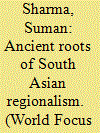

|
|
|
|
|
| Publication |
2014.
|
| Summary/Abstract |
To transcend the immediate and reach beyond the physical borders has been an ancient trait of the South Asian subcontinent civilisation. The widespread influence of the Vedic-Hindu and Buddhist religions, culture, philosophy and social practices in South-East Asia, Far East and Central Asia is well documented in history. This regional spread was not achieved by means of military conquest or forced homogenisation but rather by peaceful, voluntary absorption of ideas and practices by the local populations of these regions. This transcendence was not to seek a political hegemonic empire but something which made a deeper and long lasting cultural impact far and wide.
|
|
|
|
|
|
|
|
|
|
|
|
|
|
|
|
| 3 |
ID:
133897
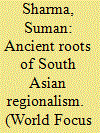

|
|
|
|
|
| Publication |
2014.
|
| Summary/Abstract |
To transcend the immediate and reach beyond the physical borders has been an ancient trait of the South Asian subcontinent civilisation. The widespread influence of the Vedic-Hindu and Buddhist religions, culture, philosophy and social practices in South-East Asia, Far East and Central Asia is well documented in history. This regional spread was not achieved by means of military conquest or forced homogenisation but rather by peaceful, voluntary absorption of ideas and practices by the local populations of these regions. This transcendence was not to seek a political hegemonic empire but something which made a deeper and long lasting cultural impact far and wide.
|
|
|
|
|
|
|
|
|
|
|
|
|
|
|
|
| 4 |
ID:
128114
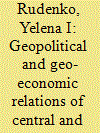

|
|
|
|
|
| Publication |
2013.
|
| Summary/Abstract |
According to many experts on ancient and Medieval history of contacts between Central and South Asian regions in previous centuries, including Janet Rizvi, "the trade from Mysore to Central Asia presented no difficulties". Obviously, not all trades who come to India from Central Asia alongwith their caravans reached coastal part of subcontinent, but rather chose as their final destination, the major cities of North India.
|
|
|
|
|
|
|
|
|
|
|
|
|
|
|
|
| 5 |
ID:
133203


|
|
|
|
|
| Publication |
2014.
|
| Summary/Abstract |
While we angst over the fate of Pakistan, the real question is, will the world survive? On earth, which is 4.5 billion years old, man is the only creature (Ashraf-ul-Makhluqat) who has had the intelligence to develop to the phenomenal level at which he finds himself today.
|
|
|
|
|
|
|
|
|
|
|
|
|
|
|
|
| 6 |
ID:
029623
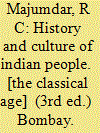

|
|
|
|
|
| Edition |
3rd ed.
|
| Publication |
Bombay, Bhartiya Vidya Bhawan, 1970.
|
| Description |
lx, 758p.: maps, plates.Hbk
|
|
|
|
|
|
|
|
|
|
|
|
Copies: C:1/I:0,R:0,Q:0
Circulation
| Accession# | Call# | Current Location | Status | Policy | Location |
| 015982 | 934/HIS 015982 | Main | On Shelf | General | |
|
|
|
|
| 7 |
ID:
030086
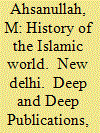

|
|
|
|
|
| Publication |
New Delhi, Deep and Deep Publications, 1986.
|
| Description |
311p.Hbk
|
|
|
|
|
|
|
|
|
|
|
|
Copies: C:1/I:0,R:0,Q:0
Circulation
| Accession# | Call# | Current Location | Status | Policy | Location |
| 027272 | 909.0917671/AHS 027272 | Main | On Shelf | General | |
|
|
|
|
| 8 |
ID:
030361
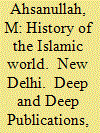

|
|
|
|
|
| Publication |
New Delhi, Deep and Deep Publications, 1986.
|
| Description |
311p.Hbk
|
|
|
|
|
|
|
|
|
|
|
|
Copies: C:1/I:0,R:0,Q:0
Circulation
| Accession# | Call# | Current Location | Status | Policy | Location |
| 028962 | 909.091767/AHS 028962 | Main | On Shelf | General | |
|
|
|
|
| 9 |
ID:
006471
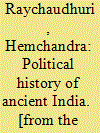

|
|
|
|
|
| Publication |
DelhI, Oxford University Press, 1996.
|
| Description |
xxxv, 849p.hbk
|
| Standard Number |
0195637895
|
|
|
|
|
|
|
|
|
|
|
|
Copies: C:1/I:0,R:0,Q:0
Circulation
| Accession# | Call# | Current Location | Status | Policy | Location |
| 038182 | 954.01/RAY 038182 | Main | On Shelf | General | |
|
|
|
|
| 10 |
ID:
142611
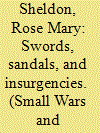

|
|
|
|
|
| Summary/Abstract |
This article explores the question of why so few insurgencies from the ancient world have ever made it onto the big screen. Many of these stories have been made into documentaries, but have been ignored by Hollywood. Even those events that have been made into Hollywood films, like the uprising of Spartacus, do not show any of the successful uprisings, only the defeats. Among the possible reasons may be Hollywood's fascination with big wars and big battles rather than small wars because they are more cinematic. Another reason is that American movies are reluctant to show successful slave uprisings or insurgencies against great powers. In the end, all movies are about the present, not the past, and thus Western bias will side with the imperial power, not the terrorist.
|
|
|
|
|
|
|
|
|
|
|
|
|
|
|
|
| 11 |
ID:
077412
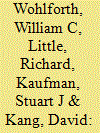

|
|
|
|
|
| Publication |
2007.
|
| Summary/Abstract |
The balance of power is one of the most influential theoretical ideas in international relations, but it has not yet been tested systematically in international systems other than modern Europe and its global successor. This article is the product of a collective and multidisciplinary research effort to redress this deficiency. We report findings from eight new case studies on balancing and balancing failure in different international systems that comprise over 2000 years of international politics. Our findings are inconsistent with any theory that predicts a tendency of international systems toward balance. The factors that best account for variation between balance and hegemony within and across international systems lie outside all recent renditions of balance-of-power theory and indeed, international relations scholarship more generally. Our findings suggest a potentially productive way to reframe research on both the European and contemporary international systems.
|
|
|
|
|
|
|
|
|
|
|
|
|
|
|
|
| 12 |
ID:
131792
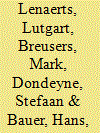

|
|
|
|
|
| Publication |
2014.
|
| Summary/Abstract |
The role of post-1991 ethnic-based federalism on conflicts along regional boundaries has been a topic of great dispute in Ethiopianist literature. This article sheds new light on the on-going debate based on original ethnographic material from the Afar-Tigray regional border zone. Contrary to other studies, conflicts appear to have reduced in that area. Two key questions are addressed: how do different groups lay future claims to land; and which role does the post-1991 government play in those claims to land and in reducing conflicts? The case study reveals that people materialise religion to lay future claims to land and that conflicts have reduced with increased involvement of the state over the past two decades, but that this reduction has come at a high cost and may therefore not be sustainable in the long term.
|
|
|
|
|
|
|
|
|
|
|
|
|
|
|
|
| 13 |
ID:
144586
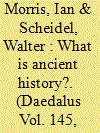

|
|
|
|
|
| Summary/Abstract |
Every society has told stories about ancient times, but contemporary ancient history was the product of two main developments. The first was the invention of writing, which made scholarly study of the past possible, and the second was the explosion of knowledge about the world from the eighteenth century onward. Europeans responded to this explosion by inventing two main versions of antiquity: the first, an evolutionary model, was global and went back to the origins of humanity; and the second, a classical model, treated Greece and Rome as turning points in world history. These two views of antiquity have competed for two hundred and fifty years, but in the twenty-first century, the evidence and methods available to ancient historians are changing faster than at any other time since the debate began. We should therefore expect the balance between the two theories to shift dramatically. We close by considering some possible areas of engagement.
|
|
|
|
|
|
|
|
|
|
|
|
|
|
|
|
|
|
|
|
|